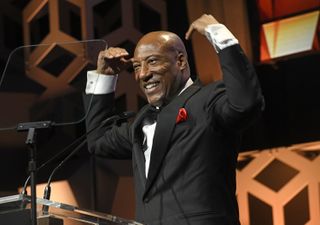Supreme Court Rules Against Byron Allen's Entertainment Studios in Comcast Suit
In a unanimous decision, the Supreme Court has ruled that a lower court was wrong to hold that Byron Allen's Entertainment Studios Networks only had to make a plausible case that race played some role in Comcast's carriage decision.
Comcast had asked the Supreme Court to reverse that lower court ruling.

The court said that the plaintiff "bears the burden" of showing that race was the "but for" cause of the alleged injury--in this case lack of carriage. That means that ESN had to show that "but for" it being an African-American-owned company, Comcast would have carried its programming.
Related: Supremes Probe Decision on Comcast Lawsuit
Comcast had argued that there were sound business reasons for its carriage decision, including "lack of programming demand, bandwidth constraints, and a preference for programming not offered by ESN," the court pointed out in its ruling.
"Few legal principles are better established than the rule requiring a plaintiff to establish causation. In the law of torts, this usually means a plaintiff must first plead and then prove that its injury would not have occurred 'but for' the defendant’s unlawful conduct," wrote Justice Neil Gorsuch for the majority (in this case the unanimity). "The plaintiffs before us suggest that [civil rights law guarantees of contract equity] departs from this traditional arrangement. But looking to this particular statute’s text and history, we see no evidence of an exception."
Related: Rep. Rush Slams Comcast Over Byron Allen Suit
Multichannel Newsletter
The smarter way to stay on top of the multichannel video marketplace. Sign up below.
ES has amended its complaint, and the court remanded the case back to the ninth Circuit court of appeals, which it said should determine "how the operative amended complaint in this case fares under the proper standard."
Justice Ruth Bader Ginsburg wrote in a concurring opinion that it was the court's remand with instructions that the lower court could consider the allegation in light of the amended complaint that allowed her to join the opinion.
"The Court holds today that Entertainment Studios must plead and prove that race was the but-for cause of its injury—in other words, that Comcast would have acted differently if Entertainment Studios were not African American owned," she wrote. "But if race indeed accounts for Comcast’s conduct, Comcast should not escape liability for injuries inflicted during the contract-formation process. The Court has reserved that issue for consideration on remand, enabling me to join its opinion."
It was the following conclusion by the court that allowed Ginsburg to support the decision and gives ESN some hope for a different decision in the future.
"To prevail, a plaintiff must initially plead and ultimately prove that, but for race, it would not have suffered the loss of a legally protected right," wrote Gorsuch. "We do not, however, pass on whether ESN’s operative amended complaint “contain[s] sufficient factual matter, accepted as true, to ‘state a claim to relief that is plausible on its face’ ” under the but for causation standard. The Ninth Circuit has yet to consider that question because it assessed ESN’s pleadings under a different and mistaken test. To allow that court the chance to determine the sufficiency of ESN’s pleadings under the correct legal rule in the first instance, we vacate the judgment of the court of appeals and remand the case for further proceedings consistent with this opinion."
But Comcast says the lower court should reach the same conclusion.
“We are pleased the Supreme Court unanimously restored certainty on the standard to bring and prove civil rights claims," said Comcast. "The well-established framework that has protected civil rights for decades continues. The nation’s civil rights laws have not changed with this ruling; they remain the same as before the case was filed.
"We now hope that on remand the 9th Circuit will agree that the District Court properly applied that standard in dismissing Mr. Allen’s case three separate times for failing to state any claim.
"We are proud of our record on diversity and will not rest on this record. We will continue to look for ways to add even more innovative and diverse programming that appeals to our diverse viewership and continue our diversity and inclusion efforts across the company.”
"Unfortunately, the Supreme Court has rendered a ruling that is harmful to the civil rights of millions of Americans," said Entertainment Studios Chairman Byron Allen. "This is a very bad day for our country. We will continue our fight by going to Congress and the presidential candidates to revise the statute to overcome this decision by the United States Supreme Court, which significantly diminishes our civil rights."
Contributing editor John Eggerton has been an editor and/or writer on media regulation, legislation and policy for over four decades, including covering the FCC, FTC, Congress, the major media trade associations, and the federal courts. In addition to Multichannel News and Broadcasting + Cable, his work has appeared in Radio World, TV Technology, TV Fax, This Week in Consumer Electronics, Variety and the Encyclopedia Britannica.

